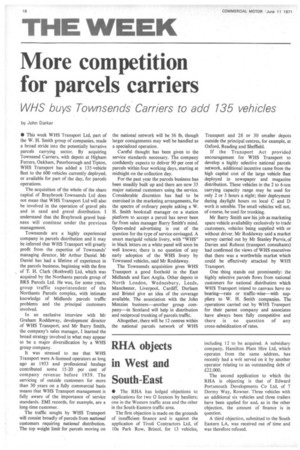More competition for parcels carriers
Page 20

If you've noticed an error in this article please click here to report it so we can fix it.
WHS buys Townsends Carriers to add 135 vehicles
by John Darker • This week WHS Transport Ltd, part of the W. H. Smith group of companies, made a broad stride into the potentially lucrative parcels carrying sector. By acquiring Townsend Carriers, with depots at Higham Ferrers, Oakham, Peterborough and Tipton, WHS Transport has added a 135-vehicle fleet to the 600 vehicles currently deployed, or available for part of the day, for parcels operations.
The acquisition of the whole of the share capital of Braybrook-Townsends Ltd does not mean that WHS Transport Ltd will also be involved in the operation of gravel pits and in sand and gravel distribution. I understand that the Braybrook gravel business will continue under the previous management.
Townsends are a highly experienced company in parcels distribution and it may be inferred that WHS Transport will greatly profit from the expertise of Townsends' managing director, Mr Arthur Daniel. Mr Daniel has had a lifetime of experience in the parcels business, beginning with the firm of T. H. Clark (Rothwell) Ltd, which was acquired by the Northants parcels group of BRS Parcels Ltd. He was, for some years, group traffic superintendent of the Northants Parcels complex, with intimate knowledge of Midlands parcels traffic problems and the principal customers involved.
In an exclusive interview with Mr Graham Roddaway, development director of WHS Transport, and Mr Barry Smith, the company's sales manager, I learned the broad strategy involved in what may appear to be a major diversification by a WHS group company.
It was stressed to me that WHS Transport were A-licensed operators as long ago as 1933 and professional haulage contributed some 15-20 per cent of company revenue before 1939. The servicing of outside customers for more than 30 years on a fully commercial basis means that WHS Transport management is fully aware of the importance of service standards. EMI records, for example, are a long-time customer.
The traffic sought by WHS Transport will consist broadly of parcels from national customers requiring national distribution. The top weight limit for parcels moving on
the national network will be 56 lb, though larger consignments may well be handled as a specialized operation.
Careful thought has been given to the service standards necessary. The company confidently expects to deliver 90 per cent of parcels within four working days, starting at midnight on the collection day.
For the past year the parcels business has been steadily built up and there are now 35 major national customers using the service. Considerable discretion has had to be exercised in the marketing arrangements, for the spectre of ordinary people asking a W. H. Smith bookstall manager on a station platform to accept a parcel has never been far from sales manager Barry Smith's mind. Open-ended advertising is out of the question for the type of service envisaged. A smart marigold vehicle livery, with "WHS" in black letters on a white panel will soon be well known; there is no question of any early adoption of the WHS livery by Townsend vehicles, said Mr Roddaway.
The Townsends acquisition gives WHS Transport a good foothold in the East Midlands and East Anglia. Other depots in North London, Wednesbury, Leeds, Manchester, Liverpool, Cardiff, Durham and Bristol give an idea of the coverage available. The association with the John Menzies business—another group company—in Scotland will help in distribution and reciprocal blinking of parcels traffic.
Altogether, there will be 12 centres within the national parcels network of WHS Transport and 28 or 30 smaller depots outside the principal centres, for example, at Oxford, Reading and Sheffield.
If the Transport Act provided encouragement for WHS Transport to develop a highly selective national parcels network, additional incentive came from the high capital cost of the large vehicle fleet deployed in newspaper and magazine distribution. These vehicles in the 2 to 6-ton carrying capacity range may be used for only 2 or 3 hours a night; their deployment during daylight hours on local C and D work is sensible. The small vehicles will not, of course, be used for trunking.
Mr Barry Smith saw his job as marketing spare vehicle availability exclusively to trade customers, vehicles being supplied with or without driver. Mr Roddaway said a market survey carried out by Mr Stanley Purvis, of Davies and Robson (transport consultants) had confirmed the views of WHS executives that there was a worthwhile market which could be effectively attacked by WHS Transport.
One thing stands out prominently: the highly selective parcels flows from national customers for national distribution which WHS Transport intend to canvass have no bearing—rate or traffic-wise—with suppliers to W. H. Smith companies. The operations carried out by WHS Transport for their parent company and associates have always been fully competitive and there is no question of any cross-subsidization of rates.


































































































































































